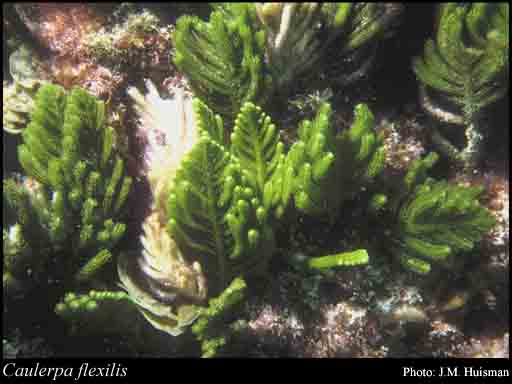- Reference
- Ann.Mus.Natl.Hist.Nat. 283, pl. 13, fig.3 (1813)
- Conservation Code
- Not threatened
- Naturalised Status
- Native to Western Australia
- Name Status
- Current

Scientific Description
Habit and structure. Stolon robust, (2–)3–4(–6) mm in diameter, densely covered with small, 2–4 times furcate, ramuli each 150–500 µm long and 80–120 µm thick near their base, tapering to spinous (often bifid) apices, epilithic. Erect primary fronds dark green, with simple or occasionally branched axes, usually 5–40 cm high and 2–6 cm across, largely to strictly alternately distichously branched with prominent, lax, second-order laterals usually 1–6 cm long and 2–4 mm across, bearing crowded ramuli on all sides. Ramuli covering all parts of the primary fronds and the second-order laterals on all sides, bifurcate near their bases, 1–3 mm long and (150–)200–300(–350) µm in diameter, terete, apically directed and slightly upwardly curved, tapering near their apices to 1–3 small, single or bifid, apical spines.
Distribution. From Geraldton, W. Aust., to Collaroy, N.S.W. and around Tas. New Zealand (North Island).
Habitat. Common in rock pools and the upper sublittoral on rough-water and moderately sheltered coasts; recorded to 40 m deep.
[After Womersley, Mar. Benthic Fl. Southern Australia I: 266 (1984)]
Distribution
- IBRA Regions
- Esperance Plains, Geraldton Sandplains, Swan Coastal Plain.
- IBRA Subregions
- Geraldton Hills, Perth, Recherche.
- IMCRA Regions
- Abrolhos Islands, Central West Coast, Leeuwin-Naturaliste, WA South Coast.
- Local Government Areas (LGAs)
- Augusta Margaret River, Cockburn, Dandaragan, Esperance, Greater Geraldton, Irwin, Rockingham, Wanneroo.